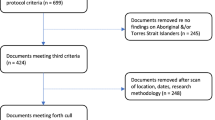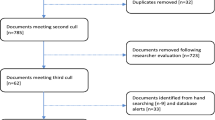Abstract
There is increasing recognition of the importance of university and school research partnerships for developing approaches to supporting student learning and wellbeing. However, this is a relatively under-explored area of research particularly in regional community contexts. Drawing on data from a 3-year study of learning and wellbeing in low SES regional schools, this paper focusses on research partnerships between a regional university and three regional government schools in the Australian state of Tasmania. The three case studies presented consider the diverse ways that university and school partnerships can serve as catalysts for teachers’ professional experimentation within their classroom practice.

Similar content being viewed by others

References
Anderson, T., & Shattuck, J. (2012). Design-based research. A decade of progress in education research? Educational Researcher, 41(1), 16–25.
Australian Bureau of Statistics. (2016). 2016 Census Quickstats. Retrieved from https://quickstats.censusdata.abs.gov.au/census_services/getproduct/census/2016/quickstat/6
Bartholomew, S. S., & Sandholtz, J. H. (2009). Competing views of teaching in a school-university partnership. Teaching and Teacher Education, 25(1), 155–165.
Berger, R. (2015). Now I see it, now I don’t: Researcher’s position and reflexivity in qualitative research. Qualitative Research, 15(2), 219–234. https://doi.org/10.1177/1468794112468475
Bickel, W. E., & Hattrup, R. A. (1995). Teachers and researchers in collaboration: Reflections on the process. American Educational Research Journal, 32(1), 35–62.
Borthwick, K., & Dickens, A. (2013). The community café: Creating and sharing open educational resources with community-based language teachers. Journal of e-Learning and Knowledge Society, 9(1), 73–83.
Braun, V., & Clarke, V. (2006). Using thematic analysis in psychology. Qualitative Research in Psychology, 3(2), 77–101. https://doi.org/10.1191/1478088706qp063oa
Clarke, D., & Hollingsworth, H. (2002). Elaborating a model of teaching professional growth. Teaching and Teacher Education, 18(8), 947–967. https://doi.org/10.1016/S0742-051X(02)00053-7
Cochran-Smith, M., & Lytle, S. L. (1999). The teacher research movement: A decade later. Educational Researcher, 28(7), 15–25. https://doi.org/10.3102/0013189X028007015
Corbett, M., & Forsey, M. (2017). Rural youth out-migration and education: Challenges to aspirations discourse in mobile modernity. Discourse: Studies in the Cultural Politics of Education, 38(3), 429–444.
Cramp, A., & Khan, S. (2019). The convivial space—Exploring teacher learning through practitioner research. Professional Development in Education, 45(3), 344–355. https://doi.org/10.1080/19415257.2018.1431957
Cuervo, H. (2016). Understanding social justice in rural education. Springer.
Creswell, J. W. (2014). Qualitative, quantitative and mixed methods approaches. Sage.
Davies, B., Edwards, J., Gannon, S., & Laws, C. (2007). Neo-liberal subjectivities and the limits of social change in university-community partnerships. Asia Pacific Journal of Teacher Education, 35(1), 27–40.
Design-Based Research Collective. (2003). Design-based research: An emerging paradigm for educational inquiry. Educational Researcher, 32(1), 5–8.
Emerson, L., Fear. J., Fox, S., & Sanders, E. (2012). Parental engagement in learning and schooling: Lessons from research. A report by the Australian Research Alliance for Children and Youth (ARACY) for the Family-School and Community Partnerships Bureau, Canberra, ACT. Retrieved from https://www.aracy.org.au/publications-resources/command/download_file/id/7/filename/Parental_engagement_in_learning_and_schooling_Lessons_from_research_BUREAU_ARACY_August_2012.pdf
Fullan, M. (2007). The new meaning of educational change (4th ed.). Teachers College Press.
Guba, E. G., & Lincoln, Y. S. (2005). Paradigmatic controversies, contradictions, and emerging confluences. In N. K. Denzin & Y. S. Lincoln (Eds.), The Sage handbook of qualitative research (3rd ed., pp. 191–216). Sage.
Geiger, V., Muir, T., & Lamb, J. (2016). Video-stimulated recall as a catalyst for teacher professional learning. Journal of Mathematics Teacher Education, 19(5), 457–475.
Halsey, J. (2018). Independent review into regional rural and remote education. Commonwealth of Australia.
Heckman, J., & Masterov, D. (2007). The productivity argument for investing in young people. Review of Agricultural Economics, 29(3), 446–493.
McLaughlin, C., & Black-Hawkins, K. (2007). School-university partnerships for educational research—Distinctions, dilemmas and challenges. The Curriculum Journal, 18(3), 327–341.
MySchool. (2018). Australian Assessment, Curriculum and Reporting Authority. https://www.myschool.edu.au/
OECD. (2010). PISA 2009 results: Overcoming social background—Equity in learning opportunities and outcomes (Vol. 2). OECD.
Prain, V., Blake, D., Deed, C., Edwards, M., Emery, S., Farrelly, C., Fingland, D., Henriksen, J., Lovejoy, V., Meyers, N., Mooney, A., Muir, T., Sbaglia, R., Swabey, K., Thomas, D., Tytler, R., & Zitzlaff, T. (2018). A framework to support personalising prescribed school curricula. British Educational Research Journal, 44(6), 1101–1119. https://doi.org/10.1002/berj.3481
Productivity Commission. (2012). Schools workforce, research report. Australian Government. Retrieved from https://www.pc.gov.au/inquiries/completed/education-workforce-schools/report/schools-workforce.pdf
Rowan, M., & Ramsay, E. (2018). Educational inequality in Tasmania: Evidence and explanations. The Australian Educational Researcher, 45(3), 277–295.
Sexton, M., & Downton, A. (2014). School mathematics leaders’ beliefs about their role when participating in a school mathematics project. Australian Primary Mathematics Classroom, 19(3), 3–5.
Shanker, S. (2010). Self-regulation: Calm, alert and learning. Education Canada, 50(3), 4–7. https://www.edcan.ca/articles/self-regulation-calm-alert-and-learning/
Shanker, S. (2017). What is Self-Reg? Retrieved from https://selfregulationinstitute.org/home/
Shanker, S., & Barker, T. (2016). Self-reg: How to help your child (and you) break the stress cycle and successfully engage with life. Penguin Press.
Tashakkori, A., & Teddlie, C. (2009). Integrating qualitative and quantitative approaches to research. The SAGE handbook of applied social research methods, 2, 283–317.
van Tartwijk, J. W. F., Zwart, R. C., & Wubbels, T. (2017). Developing teachers’ competences with the focus on adaptive expertise in teaching. In D. J. Clandinin & J. Husu (Eds.), The SAGE handbook of research on teacher education (pp. 820–835). SAGE.
Funding
This study was funded by Australian Research Council (AU) (Grant No. P150100558).
Author information
Authors and Affiliations
Corresponding author
Additional information
Publisher's Note
Springer Nature remains neutral with regard to jurisdictional claims in published maps and institutional affiliations.
Rights and permissions
About this article
Cite this article
Swabey, K., Muir, T., Thomas, D. et al. University and school research partnerships as a source of professional growth in regional communities. Aust. Educ. Res. 49, 961–977 (2022). https://doi.org/10.1007/s13384-021-00477-1
Received:
Accepted:
Published:
Issue Date:
DOI: https://doi.org/10.1007/s13384-021-00477-1



